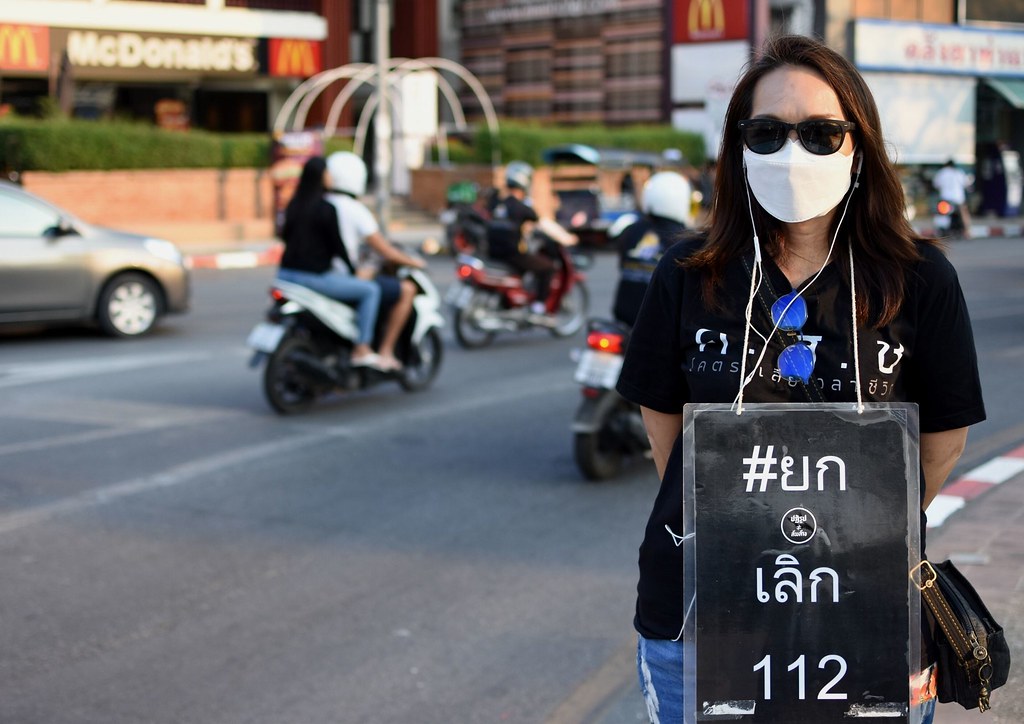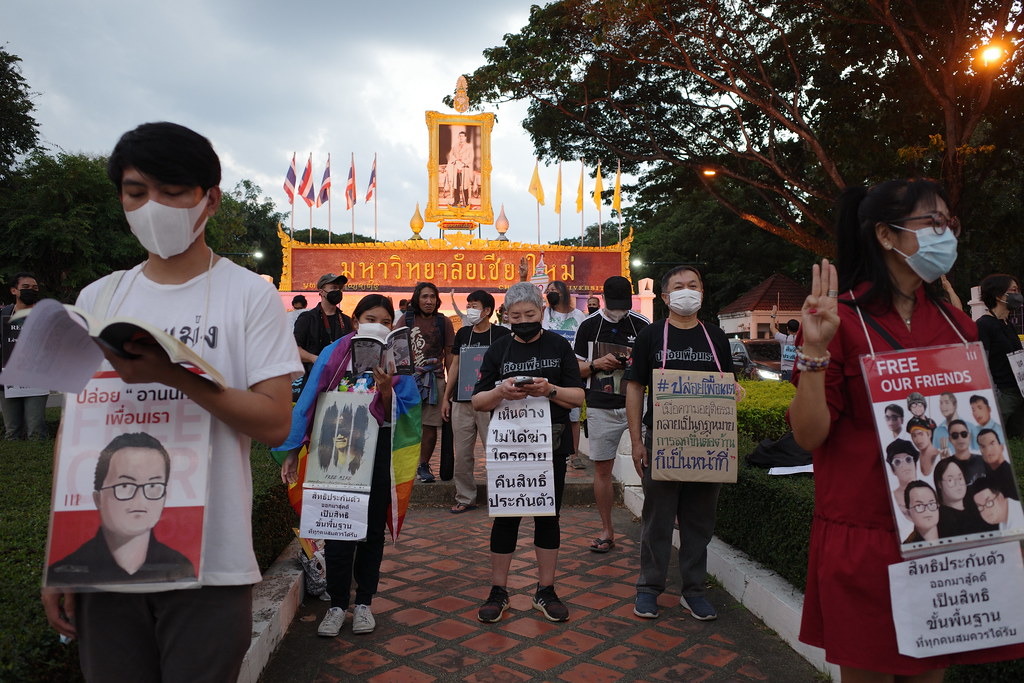Interview and photos by Wanna Taemthong
Translation by Anna Lawattanatrakul

Protesters standing along the road going by Tha Pae gate, a famous tourist landmark in Chiang Mai
On 4 March 2022, activists in Chiang Mai ended their daily “Stand Against Tyranny” protest after Jittakorn and Thawee Thiangwiset, the last two activists detained pending trial, were granted bail. The protest, which demanded the right to bail for detained activists, lasted 197 days.
Every evening for the past 6 months, protesters stood at Tha Pae gate, a famous landmark in Chiang Mai city, or in front of Chiang Mai University, and while they may hold banners or protest signs, they do not talk and there are no speeches.
Among the protesters is Chiang Mai-based writer and translator Pakavadi Weerapaspong. She said that the Stand Against Tyranny protests aimed to show support for detained activists, to communicate to society that there is an issue, as well as to criticize the courts and show those in power that there are people who refuse to yield. She said that they chose to stand still because the protest is taking place in the context of the Covid-19 pandemic and the Emergence Decree, which has been used against pro-democracy protesters.

Pakavadi Weerapaspong standing on the footpath during one of the Stand Against Tyranny protests, wearing a sign saying "Repeal Section 112," calling for the repeal of the royal defamation law
“When we’re just standing like this, [the police] can’t press charges against us. They have to keep being annoyed with us. Another thing is it started since the Stand Against Detention protests in Bangkok. The courts have never seen this. They have never been directly criticized like this. The judges themselves should think about what problems their own institution has when people stand up to criticize them,” Pakavadi said.
“If there are other ways, we would like to use them, but like I said, it’s the context during this time. Since the Covid-19 pandemic, they have also used this method of standing like this in other countries, such as protests in Israel and the US, they come out and stand. Part of it might be because of the problem of the pandemic, and another thing is that the idea of standing is a way of encouraging people in prison and telling them that we’ll keep standing with those in prison. We won’t get arrested so that they feel supported. If they are still in prison, we’ll stand every day.”
From Argentina to Chiang Mai
The 197 day protest may remind observers of the protest of the Mothers of the Plaza de Mayo in Argentina, who gathered in front of the presidential palace in Buenos Aires Argentina, once a week to demand to know the whereabouts of their children, who disappeared during Jorge Rafael Videla’s military dictatorship, and to have responsible police and military commanders brought to justice.
Pakavadi said that the similarity is that both are long-term protests which use nonviolent methods against bad governments, but the difference is that the Mothers are relatives of victims who were not previously interested in politics but wanted to know where their children are. She notes that the Mothers’ movement lasted a very long time and is still ongoing as many still have not gotten any answers, and are also calling for the perpetrators to be punished. For her, the goal of the Chiang Mai protest is shorter, since their goal for the time being is to have every detained activist granted bail.

A protester holding banners during one of the protests. The banner in their right hand says "Reform is not overthrow," a slogan now common at protests after the Constitutional Court ruled in November 2021 that calling for monarchy reform is treasonous.
Pakavadi finds that Thailand is facing similar issues as Argentina in the 1970’s and 1980’s in that dictatorships tend to want to silence dissenters.
“It is the kind of regime that cares most about the rulers. It doesn’t care about anything else,” Pakavadi said.
However, Pakavadi said that Thailand’s military government has tried to make itself not look like a dictatorship, such as by organizing elections, but the people do not actually have much choice. She also notes that while the Argentinian junta detained dissenters in detention centres which later became evidence in prosecuting them for human rights abuses, the Thai authorities harass activists over time and detain them in prisons, which became a tool for the authorities.
“I think that the Thai elite probably doesn’t really want to reform the prisons, because prisons are a tool that they can always use in the name of the law. They are legal torture camps,” she said.
Standing against tyranny

On Thursdays, the protesters gather in front of Chiang Mai University
Pakavadi said they hoped to send a message to the authorities that even though not many people joined the protest, but they do get a lot of support from passers-by, and that those who do not agree with the authorities are capable but have yet to show their full force.
“At this point, I think that while most of the protest movement has faded, standing shows that there are still people who have not given up and that there are still people supporting them, so that the society is not too quiet. I actually would like it if there were people standing in every province,” she said.
She also notes that the movement in Thailand lacks proper organization, and activists often come together as temporary groups, while the Thai government is constantly trying to impede freedom of association through laws such as the criminalization of being a member of a “secret society,” the refusal to ratify the International Labour Organization (ILO)’s freedom of association conventions, and its attempt to pass the new NGO bill, as well as investigating the Will of the People Fund, a bail fund for those facing charges for participating in pro-democracy protests.

At the end of a protest, protesters flashed the three-finger 'Hunger Games' salute, a well-recognised resistance symbol and a symbol of the 2020 - 2022 pro-democracy movement
“Thai people don’t have a lot of experience with organizing. Our labour unions are not strong. A lot of people have to come together, so that they can come up with a lot of ideas. We have to brainstorm about this kind of thing. We can’t think of it by ourselves. It has to be a movement in which a large number of people participate seriously and over a longer period of time,” Pakavadi said.

Since 2007, Prachatai English has been covering underreported issues in Thailand, especially about democratization and human rights, despite the risk and pressure from the law and the authorities. However, with only 2 full-time reporters and increasing annual operating costs, keeping our work going is a challenge. Your support will ensure we stay a professional media source and be able to expand our team to meet the challenges and deliver timely and in-depth reporting.
• Simple steps to support Prachatai English
1. Bank transfer to account “โครงการหนังสือพิมพ์อินเทอร์เน็ต ประชาไท” or “Prachatai Online Newspaper” 091-0-21689-4, Krungthai Bank
2. Or, Transfer money via Paypal, to e-mail address: [email protected], please leave a comment on the transaction as “For Prachatai English”
